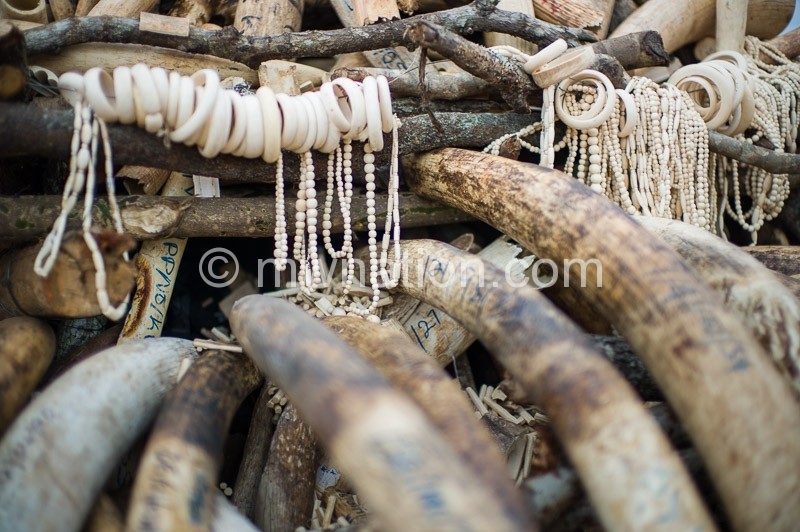Wildlife crime ring busted
A joint police and Department of National Parks and Wildlife operation has busted a wildlife trafficking ring suspected to have been terrorising the country’s national parks and game reserves.
Among the arrested locals and foreign nationals is Yun Hua Lin, 46, a Chinese who authorities say, is ‘the most wanted person’ believed to be a kingpin of international wildlife trafficking network.

Both police and the Department of National Parks and Wildlife have described Lin’s arrest as a breakthrough, after a three-month manhunt.
Lin’s arrest brings the number of those apprehended since January this year to 41, according to a police report which we have seen and verified. Of these suspects, 12 are Chinese.
Meanwhile, the US government has applauded the arrests and pledged more support to the Government of Malawi in the fight against wildlife crimes. Interpol estimates that international illegal wildlife trade is over K15 trillion per year.

The most targeted, in the syndicate, are highly valued species such as elephants, rhinos and pangolins, whose products are in high demand on the international black market, including China, yet the same is what drives Malawi’s tourism.
The police report shows that during the same period (January to date), about 250 kilogrammes of ivory have been recovered. This translates to about four arrests in a month. Combined with figures from last year, 85 arrests have been made.

Out of this number, some are serving sentences while trials for others continue to beg attention of the Judiciary.
Apart from recovering wildlife species, authorities have confiscated guns and hundreds of ammunitions allegedly supplied by Lin for purposes of poaching.
In a statement released last week, the US Embassy congratulated the Malawi Police Service and the Department of National Parks and Wildlife along with the justice system for the arrest and conviction of some suspects.
“The US Embassy is keenly following related cases involving foreign nationals, and we remain dedicated to our partnership with Malawian officials to stamp out illegal wildlife trade in the country, region, and the world,” reads the statement, in part.
With funding from the US government, Malawi established its first Wildlife Detection Dog Unit in August last year. The US support to Malawi’s wildlife protection totals over K26 billion over the past five years.
In an interview with Nation on Sunday the deputy Chinese ambassador Wang Xiusheng expressed concern about increased incidences of wildlife crime involving his country’s nationals, saying they are doing their part to help fight illegal wildlife trade.
The envoy said his government is working to improve the capacity of the Department of National Parks and Wildlife as well as organising seminars to sensitise their community in Malawi on wildlife protection.
“We have always asked our people to be law-abiding. I know some Chinese nationals are involved, for example, the Kingpin [Lin] who was recently arrested. But it is just a small number—not every Chinese is involved. Most of our people are doing so many good things in this country. But we are concerned and we will continue working with government of Malawi to stop this,” he said.
The Chinese Embassy recently donated drones to the Department of Wildlife to help detect criminal activities, especially in highly targeted national parks such as Kasungu and Liwonde.
The 12 Chinese suspects that have been apprehended in the operation is the highest for Chinese nationals arrested for the offences in a year. Records from the department responsible for wildlife, which we have seen, show that in 2018 and 2017 only four were arrested—two in each year.
This year’s crackdown reveals the extent of wildlife crimes.
“Previously, we grappled with poaching involving locals and this was usually at a small scale, but now it has become more complicated to handle because of the international connection. The battle lines are moving away from the poachers in parks to the organised criminal networks controlling the transnational trafficking chain through transit hubs and border posts all the way to the markets in the East,” explained a government official who opted for anonymity.
“The corruption needs to be checked; from the killing through to the buying/processing/logistics/customs at every border point, so this is big business involving huge organisation as with traditional drug cartels. This calls for more concerted efforts. Locals are being trained to use guns and they pose a danger to human life too,” he added.
Department of National Parks and Wildlife director Brighton Kumchedwa said the arrests are a testimony of how hard authorities are working to combat illegal trade.
While most poachers with foreign connections use dangerous weapons such as guns, he said the department with support from partners, is equally up for the task.
“There is a lot of progress. We have capacity issues, but so far Malawi is becoming a safe home for wildlife. These arrests are now sending a strong message that we are no longer a playground for wildlife trafficking,” said Kumchedwa.
In 2015, the Government of Malawi commissioned the country’s first Illegal Wildlife Trade Review. It exposed the nature and extent of the challenges faced: weak legislation, poor law enforcement and high levels of corruption as some of the reasons that exposed Malawi to both local criminals and international trafficking syndicates.
In 2016, Malawi was confirmed as southern Africa’s principal transit route for wildlife traffickers.
With all these efforts, early this year, the Convention on International Trade in Endangered Species of Wild Fauna and Flora delisted Malawi as one of the countries of primary concern on illegal wildlife crimes. Officials say the involvement of foreign nationals if not well handled, can once again dent the image of the country.





